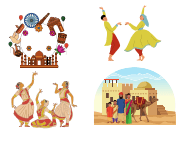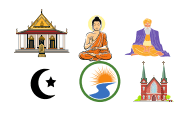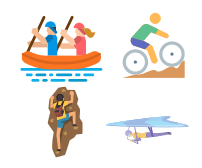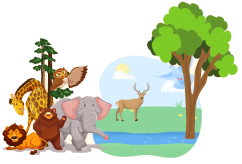A Career in Tourism
Tourism is travelling to and staying in places outside their usual environment by people for leisure or business. It is also an essential part of our life as it refreshes the mind and reduces the stress in our life.
There are three basic forms of tourism:
- Domestic tourism, inbound tourism, and outbound tourism. Domestic tourism refers to activities of a visitor within their country of residence and outside of their home.
- Inbound tourism refers to the activities of a visitor from outside of country of residence
- Outbound tourism refers to the activities of a resident visitor outside of their country of residence
The Indian tourism industry has emerged as one of the key drivers of growth among the services sector in India. Tourism in India has significant potential considering the rich cultural and historical heritage, variety in ecology, terrains and places of natural beauty spread across the country. Tourism is also a potentially large employment generator besides being a significant source of foreign exchange for the country.
According to the Indian Brand Equity Foundation, in Financial Year 2020, tourism sector in India accounted for 39 million jobs, which was 8.0% of the total employment in the country. By 2029, it is expected to account for about 53 million jobs.
There are several types of tourism in India. Among them are:
Cultural Tourism
Cultural tourism is traveling to places with rich cultural heritage and historical shreds of evidence. The purpose is exploring more about the culture, art, artifacts and architecture, religions, people and their lifestyle, customs, traditions of the place


Religious Tourism
When a person travels to a pilgrimage site primarily based on their religious belief, it is known as religious tourism. Different religions have their sacred places and people believe that they should visit these places at least once in a lifetime.
Adventure Tourism
Adventure tourism is a type of tourism involving travel in order to take part in physically challenging outdoor activities. According to the Ministry of Travel of India “Any constructive activity which tests the endurance of both a person and his equipment to its extreme limit is termed as Adventure.” Activities involved in adventure tourism are Trekking, Mountaineering, River rafting, Paragliding, Bungee Jumping, Aero-sports, Trekker huts, Mountain Biking, Valley Crossing, Bodysurfing, Canoeing, River Crossing, Bird Watching, Hot Air Ballooning, Wildlife Safari, etc.


Wellness Tourism
Wellness tourism refers to traveling for health and well-being reasons. This involves taking part in physical, psychological, or spiritual activities. It should not be confused with medical tourism in which people travel to receive treatment for a diagnosed condition.
Medical Tourism
Medical tourism is travel outside the country of residence for the purpose of receiving medical care. In the past, people traveled from less-developed countries to major medical centers in highly developed countries for treatment unavailable at home. However, in recent years people have started travelling from developed countries to developing countries for lower-priced medical treatments.


Sports Tourism
Sports tourism is travel undertaken for the purpose of participating in a sports event or watching it as a spectator. Currently, Sports Tourism is growing at a rate of around 12% as declared by the Ministry of Tourism making it one of fastest growing sectors of the tourism industry.
Eco-Tourism
According to the Oxford dictionary, ecotourism is tourism directed towards exotic, often threatened, natural environments, intended to support conservation efforts and observe wildlife. In ecotourism the destinations that attract tourists are rich in flora, fauna and cultural heritage i.e. wildlife sanctuaries, bio-diversity parks, and forest reserves. It boosts employment and financial opportunities for local people. It also encourages conservation by providing financial benefits to the people.

Tour guides are tourism professionals that lead tourists through the most interesting parts of the visit. They lead visitors through tourist attractions and give information about the attractions’ natural and cultural significance. Often, they also act as interpreters for travelers who do not speak the local language.
Their responsibilities are to:

- Greet and welcome guests to the tour.
- Outline the itinerary before beginning.
- Schedule visits and purchasing tickets to museums, galleries, protected parks, and other attractions ahead of time, if required.
- Clearly and articulately provide information to guests in an engaging manner.
- Answer any questions that the guests have.
- Remain calm, friendly, and enthusiastic at all times.
- Escort guests through the tour, taking breaks as and when needed.
| Education Pathway | ||
|---|---|---|
| Undergraduate | Post-Graduate | Some Colleges |
|
BA (History) B.Voc. (Tourism and Travel Management) B.Voc (Tourism and Hospitality Management) Bachelor of Travel & Tourism Management Any Bachelor’s Degree (BA, B.Sc, B.Com etc.) |
Post Graduate Diploma in Travel & Tourism Regional Level Guide Training Program (RLGTP) for licence from Ministry of Tourism of the Government of Tourism or the State Department of Tourism |
|



